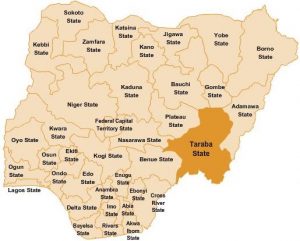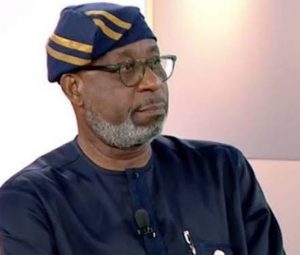It is perhaps too early to sing their praises but they have sent signals too powerful to ignore in the midst of suffering and gloom.

Taraba governor making a statement in substantive democracy
Governor Agbu Kefas of Taraba State
The first on Intervention’s list is Governor Agbu Kefas of Taraba State who has announced a 50% slash in university tuition for students in view of the current hardships in the country. Beyond that, he has said education is his priority, declaring a state of emergency in that realm. And the big story there is: he is committed to free education at the primary and secondary school levels.
These pronouncements have significance beyond Taraba State. They are statements with global import. About two weeks ago, the Vice-Chancellor of the University of Melbourne in Australia, Prof. Duncan Maskell made a strong case for free tertiary education. His reason or one of his reasons is that the idea that education is only of private benefit to individuals, not public benefit to society must be reversed.
Now, what has what a VC said in one of the most sophisticated cities in the world in faraway Australia got to do with what a governor in an agrarian state in Nigeria is doing? The connection is simple: there is something crucial there if the governor of one of the most agrarian states in an African country is doing exactly what the VC of one of the most elite universities in the world is suggesting, without them even being aware of each other.

Taraba State of Nigeria in the Nigerian space
There may be problems of poor health care delivery, poor water supply system, poor roads and all of that but if we get the content and quality of education right, we are solving these problems more systematically. There is still no better approach to redistribution than educational opportunities because it is only through that a government stands the chance of touching every family, rich or poor.
There is a serious crisis of quality teachers and it is not clear how even a determined governor can solve that problem in the short run. But, at the present rate, Intervention would not be surprised if some diasporan academics offer free teaching services in solidarity with the pronouncements of the governor.
The pronouncements are too good to hear, too good to hear from a governor with military background. It would have been more like it to hear these from a former VC, lecturer or a professor.
It would have been great if this were coming from the Federal Government of Nigeria instead of a loan scheme that is neither here nor there. But it is not TOO late yet.
It is interesting that Governor Kefas has an able media adviser in Emmanuel Bello who would let the world know of how these pronouncements play out in the field of practice though with a warning against professional congratulators who quickly end up confusing even the most determined reformers in Nigeria.

Setting an example in reducing waste in governance
And Then Governor Dauda Lawal of Zamfara State
And from Zamfara State also comes the signifying practice of reducing the number of ministries from 28 to 16. It would have been the ultimate award winning move if he reduced them to ten. Practical experience of governance at the state level has shown that, apart from Lagos, Kano, Rivers states as well as states currently in crisis such as Borno, ten is a reasonable number since there are still parastatals and sundry extra-ministerial departments.
Beyond the reduction of ministries, the governor is understood to have been spreading philanthropic wings from the Ahmadu Bello University, Zaria; Usmanu Dan Fodio University, Sokoto; the Federal University in Gusau down to Lere in Kaduna State.
Dauda Lawal, a holder of at least a Master’s degree from the Ahmadu Bello University, Zaria of yore, seems determined to send humane and progressive signals from Zamfara State.

Speaking to the sense of urgency in legislative dimension of quality governance
As Well As Senator Opeyemi Bamidele
“For us, the next task is to ensure we hit the ground running so that from tomorrow, we are able to take steps that will show that we have a clear understanding of what is to be done”
There are so much buried in this statement when we situate operative words such as ‘us’; ‘next task’; ‘hit the ground running’; ‘take steps’; ‘clear understanding’ and ‘what is to be done’.
The overall hint is that this will not be a Senate weighed down by its own contradictions and barely fulfilling all righteousness and even then only in a perfunctory manner without researchers, without critique (not criticism) and with the teeth!
It is a significant statement to keep in view, coming from a former president of the National Association of Nigerian Students (NANS) when NANS was NANS. That is not a terrible thing to say!

Presidential wrestler
Dele Alake & Wale Edun
We have earlier on recognised Presidential Adviser on Special Duties, Dele Alake and Wale Edun, his colleague in charge of Monetary Policies whom President Bola Tinubu told the nation actually removed the sentence on fuel subsidy in the president’s inaugural speech. If the president were not too stubborn and left what the aides did like that, the current gloom and sense of doom would not have descended on the country.
Intervention continues to salute presidential gatekeepers who are not overwhelmed by presidential presence or the lure of power when it comes to influencing decisions that can so delegitimise a government so badly.
Only people who have been in government can appreciate what it means in Africa for an aide to walk up to the boss and say, ‘Sir, that sentence in the speech you are about to read cannot pass because it will create more problems than it will solve’. It is not easy because presidential speeches emanate from different sources, some sources too powerful no one wants to trifle with what they have agreed with the president.
But it is the meat of the job for the genuine aide because, in social reality, perception is everything. Once people perceive that the government is out to add to their suffering and misery, too many things can give very easily. Some images are beyond repair.
Next on this list would be Mahmud Jega who wrote the most comprehensive list of the problems bedevilling Nigeria, a script more important for both the political leaders and the governed now more than when it was originally written.




























